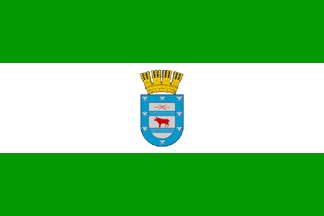
Last modified: 2006-09-30 by antónio martins
Keywords: los ángeles | rojas (santiago patricio castro) | ox | eagles: 8 | eagle (white) | coat of arms: bordure | crown: mural (golden) | lightning flash | ox (red) | waves: 2 | waves: 3 | waves: 6 |
Links: FOTW homepage |
search |
disclaimer and copyright |
write us |
mirrors

At
http://www.losangeles.cl/comunidad/historia/bandera.htm
it is said that the flag was created by 16 year old
Santiago Patricio Castro Rojas, winner of a design competition held
in April 1975. The flag was approved the following month by communal
decree of Mayor Mario Ríos Santander. (The flag designer died suddenly
at the age of 20; the flag he created is visible on his tombstone.)
The flag is spanish style triband of green, white,
and green, though the text at
http://www.losangeles.cl/comunidad/historia/bandera.htm
doesn’t specify precisely the relative width of the middle stripe
— it’s just «wider» («más ancha»)
than the others. The ratio is not mentioned, but the image on line is
roughly 2:3.
The coat of arms is set on the middle of the
white stripe, its height slightly larger than 1/3rd of the flag’s
height.
António Martins, 05 Dec 2002
.gif)
Arms: Argent, an ox gules between two bars wavy azure, each
charged with two barrulets wavy argent, in chief three lightning flashes
gules crossed, one in fess and two per saltire; the whole within a border
azure charged with eight eagles displayed argent. (The birds could also
be called eaglets, since they’re so small.)
Mike Oettle, 06 Dec 2002
The meaning of these arms is as follows:
Anything below this line was not added by the editor of this page.